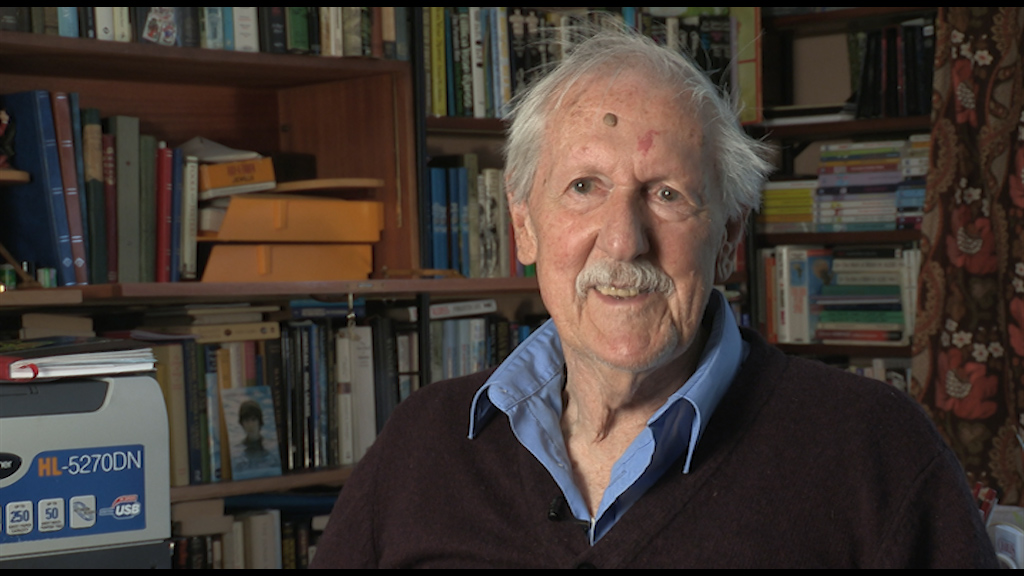NEXT STORY

Giving barn dancing a whole new meaning
RELATED STORIES

NEXT STORY

Giving barn dancing a whole new meaning
RELATED STORIES


|
Views | Duration | |
|---|---|---|---|
| 31. 'Going Dutch' in Sumatra | 42 | 02:54 | |
| 32. Giving barn dancing a whole new meaning | 34 | 04:26 | |
| 33. How the British Army scuppered my plans for matrimony | 33 | 04:45 | |
| 34. Killing time in Hong Kong | 33 | 03:23 | |
| 35. A dismal homecoming | 34 | 03:11 | |
| 36. Gaining work experience in Oxford’s bookshops | 43 | 03:27 | |
| 37. Creating The Brightfount Diaries | 49 | 04:57 | |
| 38. My journals in the Bodleian Library | 46 | 01:45 | |
| 39. Encountering TS Eliot | 79 | 01:48 | |
| 40. Colin Wilson in London | 61 | 01:35 |


What happened to the British troops who were there, possibly in their thousands... maybe not? Anyhow, the solution of Royal Signals was to shift us to Sumatra. Sumatra.
The dictator there [in Thailand] was a pretty ruthless man, but he had taken control over Sumatra, and the trouble was Sumatra had been owned by the Dutch. So, the Dutch were coming back and the British, for various reasons, some good, some bad, hated the Dutch. And so, a deal was done with the Indonesians that the British could stay unharmed in Sumatra for five years, or whatever, provided they wouldn't let the Dutch back.
And so, there we suddenly found ourselves with a little war with the Dutch. I mean, it beats cock-fighting, doesn't it? Oh, dear, we drove them off... you know, they would try and land, and we wouldn't have it. And so, that pleased the Indonesians… Indonesians, yes, and so they put up with us, but it was only going to be pro tem. And there were... again, one understands... there were those people there who didn't want the British any more than they wanted the Dutch. But we didn't interfere much. We had our various bases, and so on and so on. And we took over... well, we took over what had been a small Dutch village, and so we could live in Dutch accommodation, and what's more we could go looting in all the other houses that had belonged to the Dutch.
Brian Aldiss (1925-2017) was an English writer and anthologies editor, best known for his science fiction novels and short stories. He was educated at Framlingham College, Suffolk, and West Buckland School, Devon, and served in the Royal Signals between 1943-1947. After leaving the army, Aldiss worked as a bookseller in Oxford, an experience which provided the setting for his first book, 'The Brightfount Diaries' (1955). His first science fiction novel, 'Non-Stop', was published in 1958 while he was working as literary editor of the 'Oxford Mail'. His many prize-winning science fiction titles include 'Hothouse' (1962), which won the Hugo Award, 'The Saliva Tree' (1966), which was awarded the Nebula, and 'Helliconia Spring' (1982), which won both the British Science Fiction Association Award and the John W Campbell Memorial Award. Several of his books have been adapted for the cinema. His story, 'Supertoys Last All Summer Long', was adapted and released as the film 'AI' in 2001. His book 'Jocasta' (2005), is a reworking of Sophocles' classic Theban plays, 'Oedipus Rex' and 'Antigone'.
Title: 'Going Dutch' in Sumatra
Listeners: Christopher Sykes
Christopher Sykes is an independent documentary producer who has made a number of films about science and scientists for BBC TV, Channel Four, and PBS.
Tags: Royal Signals, Sumatra, Indonesia
Duration: 2 minutes, 54 seconds
Date story recorded: September 2014
Date story went live: 17 August 2015